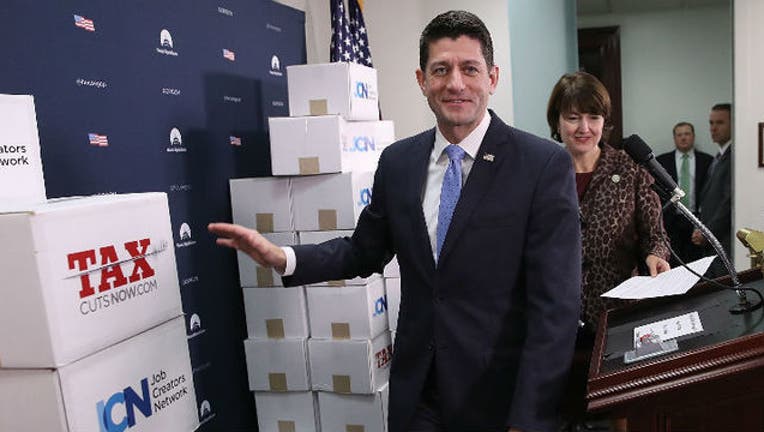Challenge to US House to pledge re-election before tax vote

Speaker of the House Paul Ryan (R-WI) arrives for a press conference following a weekly meeting of the House Republican caucus November 14, 2017 in Washington, DC. (Photo by Win McNamee/Getty Images)
(KMSP) - Former Vice President Walter Mondale and former Minnesota Gov. Arne Carlson have issued a challenge to members of the U.S. House who vote for the Republican tax reform bill, H.R. 1: Publicly pledge to run for re-election.
“This is the only way the public can express its voice on policies that are harmful to the general good and practices that are clearly undemocratic,” Mondale and Carlson said in a statement released through the office of Democratic Rep. Tim Walz. “We are fearful that some members will vote ‘yes,’ then announce their retirement to spend more time with their families and accept lucrative employment from those who reap the benefits.”
“As former public officials, we are increasingly concerned about the role of money in influencing public policy,” Mondale and Carlson said. “The United States House of Representatives is on its way to pass out major tax legislation without public hearings. In addition, they leak out information daily about the possibility of major changes, thereby preventing analysis and commentary. This is repugnant in a democratic society, period. There are two certainties in the tax bill: large financial rewards to the Republican donor base and a massive increase in our national debt.”
The Mondale-Carlson challenge comes as 12 Republican members of the House have already announced plans to retire, and 10 more plan to leave their House seats to run for governor or the Senate.
House Republicans retiring: Rep. Ileana Ros-Lehtinen (Florida), Rep. Lynn Jenkins (Kansas), Rep. David Trott (Michigan), Rep. Frank LoBiondo (New Jersey), Rep. Charlie Dent (Pennsylvania), Rep. John Duncan Jr. (Tennessee), Rep. Ted Poe (Texas), Rep. Sam Johnson (Texas), Rep. Jeb Hensarling (Texas), Rep. Lamar Smith (Texas), Rep. Bob Goodlatte (Virginia), Rep. Dave Reichert (Washington).
House Republicans running for Senate or governor: Rep. Raul Labrador (Idaho), Rep. Luke Messer (Indiana), Rep. Todd Rokita (Indiana), Rep. James Renacci (Ohio), Rep. Lou Barletta (Pennsylvania), Rep. Steve Pearce (New Mexico), Rep. Kristi Noem (South Dakota), Rep. Diane Black (Tennessee), Rep. Marsha Blackburn (Tennessee), Rep. Evan Jenkins (West Virginia).
The House is expected to approve the massive restructuring of the nation's tax code on Thursday. President Donald Trump will personally lobby for passage of the bill on Capitol Hill, but the arms that need twisting are in the Senate.
Republican Sen. Ron Johnson of Wisconsin came out in opposition of the bill Wednesday, saying small businesses need a bigger break
"I wouldn't vote for it just that simple, but doesn't mean I don't want to vote for a real solution and so that's why I'm working with the Senate, House and White House to get one,” Johnson said.
Johnson may not be alone. The tax bill was already going to be a tight vote in the Senate, where Republicans have just a two seat majority. Complicating the measure is a question about whether to repeal the Obamacare provision that forces everyone to obtain health insurance. The chief vote counter in the House thinks this will get resolved, but it depends on the Senate.
“Hopefully they get their bill out not long after Thanksgiving so that we can actually go to a conference committee and resolve the differences between the House and Senate and get a bill on President Trump's desk by the end of this year,” said Rep. Steve Scalise (R-Lousiana).
That end of the year goal is still theoretically possible. If the House passes its version, and the Senate passes its version, the two chambers must then come together and produce a version that both can agree on.

